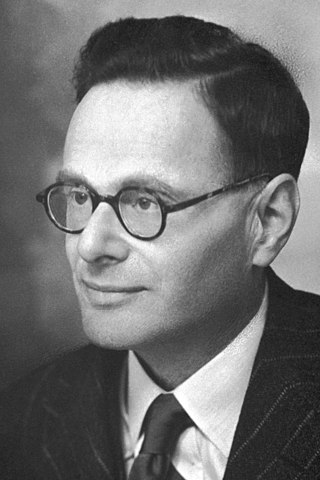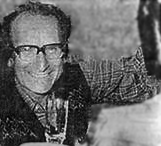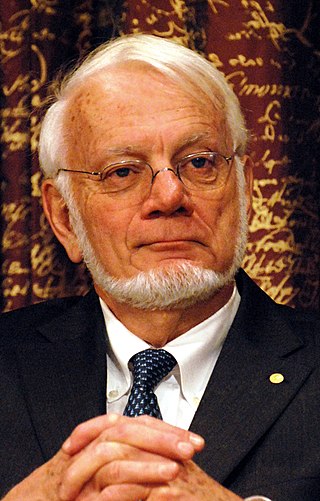
Sir Hans Adolf Krebs, FRS was a German-British biologist, physician and biochemist. He was a pioneer scientist in the study of cellular respiration, a biochemical process in living cells that extracts energy from food and oxygen and makes it available to drive the processes of life. He is best known for his discoveries of two important sequences of chemical reactions that take place in the cells of nearly all organisms, including humans, other than anaerobic microorganisms, namely the citric acid cycle and the urea cycle. The former, often eponymously known as the "Krebs cycle", is the sequence of metabolic reactions that allows cells of oxygen-respiring organisms to obtain far more ATP from the food they consume than anaerobic processes such as glycolysis can supply; and its discovery earned Krebs a Nobel Prize in Physiology or Medicine in 1953. With Hans Kornberg, he also discovered the glyoxylate cycle, a slight variation of the citric acid cycle found in plants, bacteria, protists, and fungi.

Michael Smith was a British-born Canadian biochemist and businessman. He shared the 1993 Nobel Prize in Chemistry with Kary Mullis for his work in developing site-directed mutagenesis. Following a PhD in 1956 from the University of Manchester, he undertook postdoctoral research with Har Gobind Khorana at the British Columbia Research Council in Vancouver, British Columbia, Canada. Subsequently, Smith worked at the Fisheries Research Board of Canada Laboratory in Vancouver before being appointed a professor of biochemistry in the UBC Faculty of Medicine in 1966. Smith's career included roles as the founding director of the UBC Biotechnology Laboratory and the founding scientific leader of the Protein Engineering Network of Centres of Excellence (PENCE). In 1996 he was named Peter Wall Distinguished Professor of Biotechnology. Subsequently, he became the founding director of the Genome Sequencing Centre at the BC Cancer Research Centre.

Marshall Warren Nirenberg was an American biochemist and geneticist. He shared a Nobel Prize in Physiology or Medicine in 1968 with Har Gobind Khorana and Robert W. Holley for "breaking the genetic code" and describing how it operates in protein synthesis. In the same year, together with Har Gobind Khorana, he was awarded the Louisa Gross Horwitz Prize from Columbia University.

Daniel Nathans was an American microbiologist. He shared the 1978 Nobel Prize in Physiology or Medicine for the discovery of restriction enzymes and their application in restriction mapping.

Irwin Allan Rose was an American biologist. Along with Aaron Ciechanover and Avram Hershko, he was awarded the 2004 Nobel Prize in Chemistry for the discovery of ubiquitin-mediated protein degradation.

Aaron Ciechanover is an Israeli biologist who won the Nobel Prize in Chemistry for characterizing the method that cells use to degrade and recycle proteins using ubiquitin.

César Milstein, CH, FRS was an Argentine biochemist in the field of antibody research. Milstein shared the Nobel Prize in Physiology or Medicine in 1984 with Niels Kaj Jerne and Georges J. F. Köhler for developing the hybridoma technique for the production of monoclonal antibodies.

The National Institute for Medical Research (NIMR), was a medical research institute based in Mill Hill, on the outskirts of north London, England. It was funded by the Medical Research Council (MRC);
Hans Neurath was a biochemist, a leader in protein chemistry, and the founding chairman of the Department of Biochemistry at the University of Washington in Seattle. He was born in Vienna, Austria, and received his doctorate in 1933 from the University of Vienna. He then studied in London and at the University of Minnesota. In 1938, he was appointed professor at Duke University, where he established a research program on the physical chemistry of proteins.

Louis Joseph Ignarro is an American pharmacologist. For demonstrating the signaling properties of nitric oxide, he was co-recipient of the 1998 Nobel Prize in Physiology or Medicine with Robert F. Furchgott and Ferid Murad.

Meir Wilchek is an Israeli biochemist. He is a professor at the Weizmann Institute of Science.
Douglas C. Prasher is an American molecular biologist. He is known for his work to clone and sequence the genes for the photoprotein aequorin and green fluorescent protein (GFP) and for his proposal to use GFP as a tracer molecule. He communicated his pioneering work to Martin Chalfie and Roger Y. Tsien, but by 1991 he was unable to obtain further research funding, and left academia. Eventually, he had to abandon science. Chalfie and Tsien were awarded the 2008 Nobel Prize in Chemistry for work that they publicly acknowledged was substantially based on Prasher's work; through their efforts and those of others, he returned to scientific research in June 2010.

Thomas Arthur Steitz was an American biochemist, a Sterling Professor of Molecular Biophysics and Biochemistry at Yale University, and investigator at the Howard Hughes Medical Institute, best known for his pioneering work on the ribosome.

Roger Sidney Goody is an English biochemist who served as director at the Max Planck Institute for Molecular Physiology in Dortmund from 1993 until 2013. Since 2013 he is Emeritus Director of the institute.

This is a list of women chemists. It should include those who have been important to the development or practice of chemistry. Their research or application has made significant contributions in the area of basic or applied chemistry.
Janet E. Mertz is an American biochemist, molecular biologist, and cancer researcher. She is currently the Elizabeth McCoy Professor of Oncology in the McArdle Laboratory for Cancer Research at the University of Wisconsin–Madison. Mertz is best known for disputing Lawrence Summers' 2005 suggestion that women lack the intrinsic aptitude to excel in mathematics at the highest level and for discovering an easy method for joining DNAs from different species. This latter finding initiated the era of genetic engineering whose ramifications form the basis of modern genetics and the biotechnology industry.

Patrick J. (Pat) Casey is a biochemist and molecular pharmacologist and is a James B. Duke Professor of Pharmacology and Cancer Biology at Duke University School of Medicine. In 2005, he relocated to Singapore to help found the Duke-NUS Medical School Singapore, where he served as its Senior Vice Dean of Research through July, 2023.

Bernard Leonard (Bernie) Horecker (1914–2010) was an American biochemist known for work on the pentose phosphate pathway, and for cellular regulation in general.